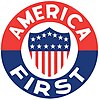 | |
| Abbreviation | AFC |
|---|---|
| Formation | September 4, 1940 |
| Founder | Robert D. Stuart Jr. |
| Founded at | Yale Law School, New Haven, Connecticut, U.S. |
| Dissolved | December 11, 1941 |
| Type | Non-partisan pressure group |
| Purpose | Non-interventionism |
| Headquarters | Chicago, Illinois, U.S. |
Membership (1941) | 800,000–850,000 |
Chairman | Robert E. Wood |
Spokesperson | Charles Lindbergh |
Key people | |
| Subsidiaries | 450 chapters |
Revenue (1940) | $370,000 |
| This article is part of a series on |
| Conservatism in the United States |
|---|
 |
The America First Committee (AFC) was an American isolationist pressure group against the United States' entry into World War II.[1][2] Launched in September 1940, it surpassed 800,000 members in 450 chapters at its peak.[3] The AFC principally supported isolationism for its own sake, and its varied coalition included Republicans, Democrats, farmers, industrialists, communists, anti-communists, students, and journalists – however, it was controversial for the anti-Semitic and pro-fascist views of some of its most prominent speakers, leaders, and members.[4][5][6][7] The AFC was dissolved on December 11, 1941, four days after the attack on Pearl Harbor brought the United States into the war.
The AFC argued that no foreign power could successfully attack a strongly defended United States, that a British defeat by Nazi Germany would not imperil American national security, and that giving military aid to Britain would risk dragging the United States into the war. The group fervently opposed measures for the British advanced by President Franklin D. Roosevelt such as the destroyers-for-bases deal and the Lend-Lease bill, but failed in its efforts to block them.
The AFC was founded by Yale Law School student R. Douglas Stuart Jr., a Princeton graduate who was heir to the Quaker Oats Company fortune, and headed by Robert E. Wood, a retired U.S. Army general who was chairman of Sears, Roebuck and Co. Its highest-profile early member was Henry Ford, the automotive pioneer and notorious anti-Semite, who resigned in controversy.[8][6] Halfway through the committee's 15-month existence, aviator Charles Lindbergh joined it and became the most prominent speaker at its rallies. Lindbergh's presence resulted in increased criticism that America First embraced overt anti-Semitism and fascist sympathies. Historian Susan Dunn has concluded that, "Though most of its members were probably patriotic, well-meaning, and honest in their efforts, the AFC would never be able to purge itself of the taint of anti-Semitism."[6]
- ^ Cite error: The named reference
decondewas invoked but never defined (see the help page). - ^ Cite error: The named reference
cole-1974-115was invoked but never defined (see the help page). - ^ Cite error: The named reference
Wayne S. Cole 1953was invoked but never defined (see the help page). - ^ Calamur, Krishnadev (2017-01-21). "A Short History of 'America First'". The Atlantic. Retrieved 2018-11-23.
- ^ Bennett, Brian (20 January 2017). "'America First,' a phrase with a loaded anti-Semitic and isolationist history". Los Angeles Times. Retrieved 2018-11-23.
- ^ a b c Cite error: The named reference
dunn-66was invoked but never defined (see the help page). - ^ Dunn p 57
- ^ Baime, A. J. (2014). The arsenal of democracy : FDR, Detroit, and an epic quest to Arm an America at war. Boston: Houghton Mifflin Harcourt. ISBN 978-0-547-71928-3. OCLC 859298844.